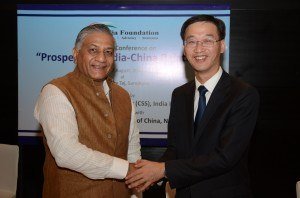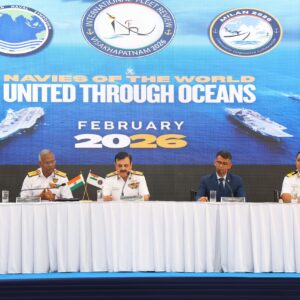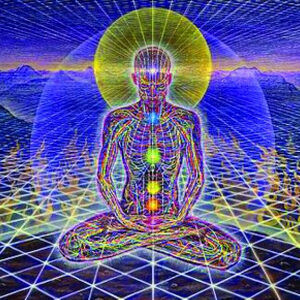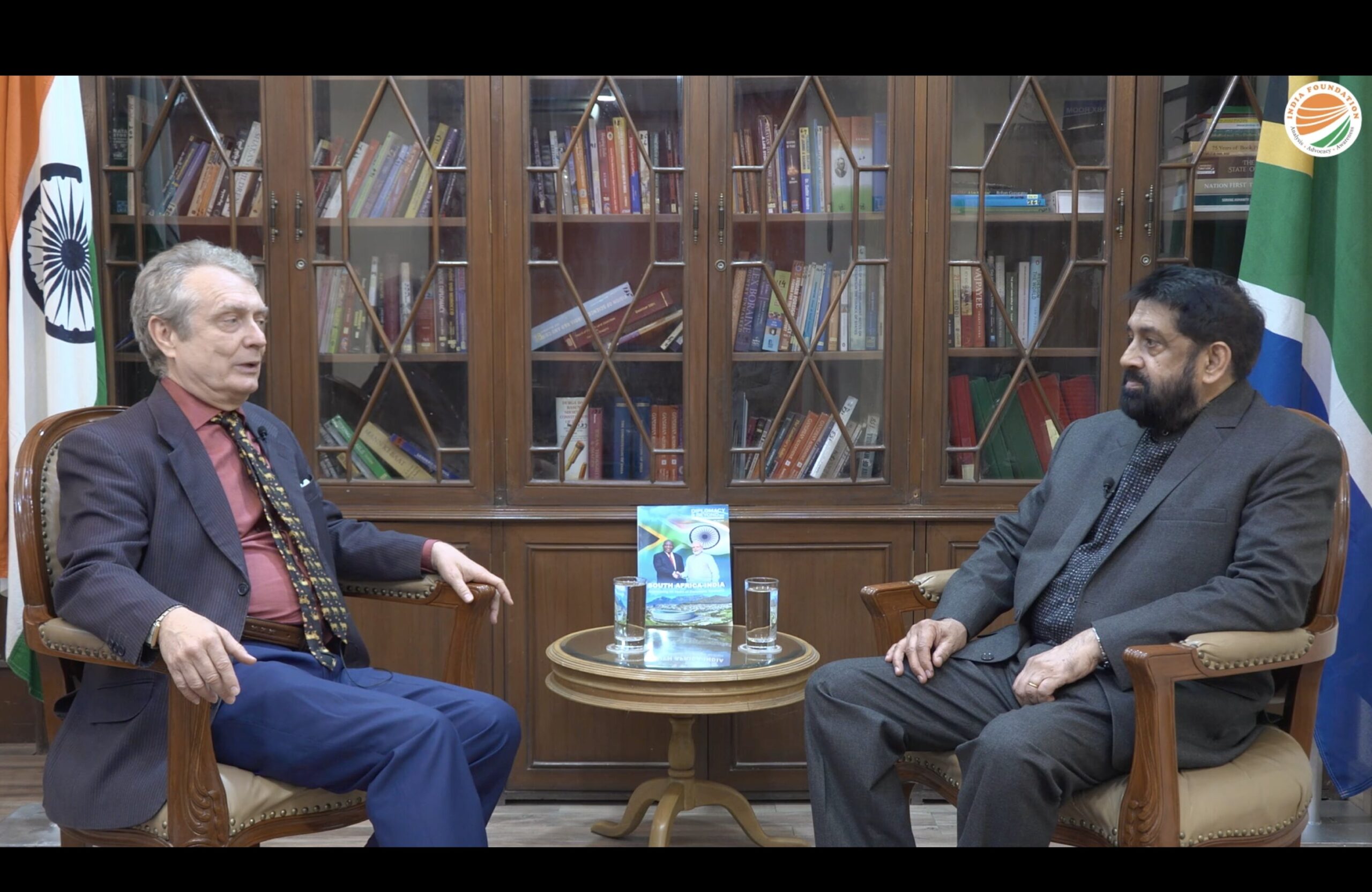Inaugural Session
Synergized India-China relations for Asian century: Gen V. K. Singh
“With the election of the new government there is an upswing in making relations better between both the nations. The need now is to enhance people to people relations in order to strengthen mutual trust and understanding.”, said Gen V.K. Singh, Union Minister of State ( Independent Charge) for the Development of North eastern region and the Minister of State for External Affair while inaugurating India Foundation’s two day bilateral conference on ‘Prospects of India-China Relations’.
In sync with the objective to discuss and deliberate on issues of national importance, India Foundation, a New Delhi based think tank in collaboration with Embassy of People’s Republic of China has organized the two day bilateral conference. The conference was inaugurated by Union Minister of State ( Independent Charge) Development of North eastern region and Minister of State for External Affairs Gen. V.K. Singh & and Charge’d affairs, Embassy of People’s Republic of China, Yao Jing on August 26.
Charge’d affairs, Embassy of People’s Republic of China; Yao Jing cited mutual historical linkages to increase people to people interactions between both the nations. “Relationship between India and China must be built on the basis of people and their interests. This is why a civilizational approach is a prerequisite to build relations between both the nations.” he said. Mr. Yao Jing emphasized that both China and India have established a policy for the future, which is people oriented, development-oriented, and the world’s well-being oriented.
With respect to the existing border issues, Gen V.K. Singh urged both nations to avoid confrontation by showing mutual respect for each other. He also suggested that joint ventures between India and China can be initiated, which can lead to creation of knowledge and innovation.
The 2 day conference is being attended by 25 delegates from India and China which includes former diplomats, subject experts, former service chiefs, and academicians. Under the umbrella of ‘China-India relations in a Multi-Polar world’, the conference aims to discuss and debate on a diverse issues which range from cultural linkages , trade imbalances , sea and maritime co-operation , understanding terror issues and dwelling on counter approaches and border management. The bilateral conference is a first step in a series of initiatives which the India Foundation aspires to take in order to cement India-China relations for a prosperous Asia.
Conference
A bilateral conference on ‘Prospects of India-China Relations’ was organized by India Foundation in collaboration with Embassy of People’s Republic of China. The conference was inaugurated by Union Minister of State (Independent Charge) for the Development of North eastern region and the Minister of State for External Affair Gen. (Retd.) V. K. Singh and Charge’d affairs, Embassy of People’s Republic of China, Yao Jing. The conference was held over a span of two days from August 26 to August 27, 2014. The Chinese delegation had a total of 13 delegates and the delegation from India had 12 delegates.
The bilateral conference is a first step in a series of initiatives which the India Foundation aspires to take in order to cement India-China relations for a prosperous Asia. The delegates included former diplomats, subject experts, former service chiefs, and academicians. Under the umbrella of ‘China-India relations in a Multi-Polar world’ the conference had a total of seven sessions. The sessions touched upon varying topics ranging from cultural interaction, trade imbalance, co-operation in sphere of water and climate, freedom of seas and maritime co-operation, terrorism and approaches to countering it to border management.
Charge’d affairs, Embassy of People’s Republic of China; Yao Jing quoted Prime Minister Narendra Modi citing his mention of India & China as two bodies having the same spirit. He mentioned of mutual historical linkages to increase people to people interactions between both the nations. “Relationship between India and China must be built on the basis of people and their interests. This is why a civilizational approach is a prerequisite to build relations between both the nations.” he said. Mr. Yao Jing emphasized that both China and India have established a policy for the future, which is people oriented, development-oriented, and the world’s well-being oriented. He stressed on partnership for development, welfare of people and to get rid of poverty. He also said that both the nations have a lot to learn from each other. Like India can learn about building infrastructure, railways etc from China and China can learn from India’s expertise in IT, pharma industry etc. There is a lot of scope in tourism & bilateral trade for both nations.
Gen V.K. Singh started his address by reminding of the good times both the nations shared citing names of Doctor Kotnis & Pt. Nehru. He said there is enough space in the world for both nations to mutually co-exist and flourish. “With the election of the new government there is an upswing in making relations better between both the nations. The need now is to enhance people to people relations in order to strengthen mutual trust and understanding”, said Gen V.K. Singh. He urged both nations to avoid confrontation by showing mutual respect for each other and building trust. Gen. V.K. Singh said that with synergy in relations between India & China Asia can become fountainhead of innovation & knowledge once again. He also suggested that joint ventures between India and China can be initiated which will also improve people to people relations.
The first session was “Cultural Linkages-Prospects for greater interaction in Cultural Sphere”. Both the delegations agreed that we are two very ancient civilizations which have co-existed for centuries. Buddhist philosophy has had a great impact on Chinese thought. We had a lot of cultural exchanges through trade along with silk route. Today due to certain reasons there is a lack of understanding & mutual trust. We also need to resist the western cultural hegemony. To strengthen our relations we need a new silk route called ‘Digital Silk Route’. We need more people to people exchanges through tourism, cinema, and sports. We need to think on ways to make each other’s language attractive and think of ways to interact which go beyond language. We can build a World Cultural Forum which spreads universal values.
The second session dealt with “Sino-Indian Trade and Investment: Rectifying the Imbalances”. During the session topics related to trade deficit and investment were discussed. There was agreement on the need to share technology for fast infrastructure growth. China with a huge foreign exchange reserve can make large investments in India for greater returns and India shall serve an ideal market for Chinese investments.
The third session was regarding “Water and Climate Change: Need for Co-operation”. Regarding co-operation in water, it was felt by the Indian delegates that China wasn’t transparent with India regarding its projects in Brahmaputra and other rivers. Also it was realized that issues of water table and water quality will be of paramount importance in future. As regards Climate Change there was an agreement on both sides to collaborate to raise issues of mutual interest on multilateral forums. It’s time we present an Asian model to counter Climate Change.
In the fourth session “Freedom of Seas and Maritime Co-operation” was discussed. The need to have more understanding of each other’s claims to sea waters was realized. It was felt that instead of confining ourselves to Indian Ocean we need to think of Indo-Pacific as a whole. Also some delegates realized on importance of having more Naval exercises between the two nations. Some also raised concern regarding China’s policy of taking over ports in Indian Ocean and their joint naval exercises with Pakistan in Arabian Sea.
Session five dealt with “Understanding Terrorism and Co-operative Approaches of Countering it.” The session helped understanding each other’s mindset and approaches as regards terrorism. Chinese delegates felt that terrorism isn’t state sponsored and shouldn’t be linked to a particular religion. Indian delegation strongly objected to this worldview of terrorism and stressed the importance of looking into reasons as to how terrorists validate their acts by use of theocracy. Also with rise in radical tendencies in China, there is a lot China can learn from Indian experience and India can help China fight terror. There was also a point raised during the discussion that India doesn’t require China to mediate between India-Pakistan to deal with terror sponsored by Pakistan and China needs to realize the larger goals of a Global Islamic state which terrorists around the world have.
The sixth session was regarding “Border Management for Peace and Tranquillity”. During this session too the difference in perception as regards border issues was realized. Indian delegation felt that border issue is one such issue which until not resolved will be a bottleneck between Indo-China relations and we won’t be able to realize our full potential. There were various suggestions from the delegates like reaching an interim solution, discussing border management rather than border resolution etc. Indian delegation however thought that with strong leadership on both sides today we need to mutually agree, define and freeze the LAC. Also it was largely agreed that until there is no final resolution, steps should be taken to improve the lives of the local population.
The seventh and final session was on “China-India relations in a Multi-Polar World.” the session was very frank and open. Indian side raised the issue of how China was trying to contain Indian growth and development. It was said that we needed a stable and balanced power equation and not a new hegemony. Also there shouldn’t be games of balance of power amongst the two nations. Chinese delegation felt that BRICS could be a new pole in this multi-polar world alongside US and EU. We are two emerging economies and should be thinking of collaborating to achieve our maximum capacity.
The conference came to a conclusion on a very positive note. Since this conference was a first in a series of similar bilateral talks, delegates from both the countries ended up knowing each other’s thought process well. Also the contentious issues and areas of mutual interest were discussed. It was realized that by discussing and knowing each other more only can we reach a common ground.
Bilateral Conference on Prospects of India-China Relations
Bilateral Conference on Prospects of India-China Relations
DSC_2616 DSC_2519 DSC_2444 DSC_2358 DSC_2328 DSC_2327 DSC_2326





